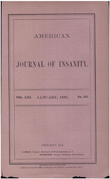Treatment outcomes for primary care patients with major depression and lifetime anxiety disorders
Abstract
OBJECTIVE: Major depression occurs with generalized anxiety disorder and panic disorder in up to 60% of psychiatric and primary care patients. This comorbidity has been associated with greater severity of depression, poorer psychosocial functioning, and poorer treatment outcomes in psychiatric samples. This study examined the clinical outcomes for depressed primary care patients with and without a lifetime anxiety disorder. METHOD: A total of 157 primary care patients who met criteria for major depression were randomly assigned to standardized interpersonal psychotherapy or pharmacotherapy with nortriptyline and were assessed at baseline and at 4 and 8 months on severity of depression, psychosocial functioning, and health-related functioning. RESULTS: Depressed patients with a comorbid anxiety disorder presented with significantly more psychopathology and tended to prematurely terminate treatment more frequently than patients with major depression alone. Both standardized depression-specific treatments were effective for depressed patients with and without a comorbid generalized anxiety disorder, although time to recovery was longer for the former. Patients with lifetime panic disorder showed poor recovery in response to psychotherapy or pharmacotherapy. CONCLUSIONS: Standardized psychotherapy and pharmacotherapy are effective for patients with major depression with and without a generalized anxiety disorder. However, the longer time to recovery for the former group and lack of response to these treatments by patients with lifetime panic disorder suggest that primary care physicians should carefully assess history of anxiety disorder among depressed patients so as to select a proper intervention.
Access content
To read the fulltext, please use one of the options below to sign in or purchase access.- Personal login
- Institutional Login
- Sign in via OpenAthens
- Register for access
-
Please login/register if you wish to pair your device and check access availability.
Not a subscriber?
PsychiatryOnline subscription options offer access to the DSM-5 library, books, journals, CME, and patient resources. This all-in-one virtual library provides psychiatrists and mental health professionals with key resources for diagnosis, treatment, research, and professional development.
Need more help? PsychiatryOnline Customer Service may be reached by emailing [email protected] or by calling 800-368-5777 (in the U.S.) or 703-907-7322 (outside the U.S.).



